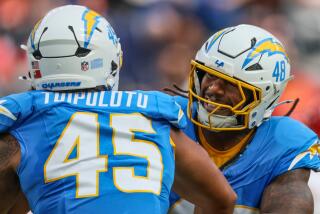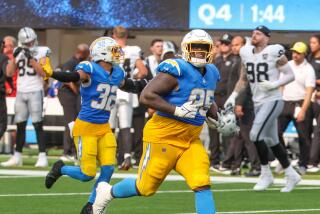Chargers Charge Gaps All the Way to the Top
The San Diego football team has seized first place in the AFC West this year with carefully coached, uniquely aggressive defensive men who attack not the players in the offensive line but the gaps between those players.
Up and down the line, as the Chargers won Sunday, 13-10, it worked something like this:
When Seattle snapped the ball, San Diego’s defensive linemen and a linebacker or two charged into all the gaps from end to end to form a long, solid moving wall that Seahawk running back Ricky Watters hit 21 times, gaining only 54 yards and no touchdowns.
When the play was a pass instead of a run, the Chargers’ defensive people, already charging into the gaps, kept rushing to hurry Seattle passer Jon Kitna into an ineffective day: one touchdown, 140 net passing yards.
As directed by former USC middle linebacker Junior Seau, one of the most dominating players at his position since Dick Butkus, the strange San Diego defense has held three opponents to three touchdowns this season--one apiece--leading to the Chargers’ 4-1 start and a date with Green Bay next Sunday.
* * * Football Turnovers Overrated
Year in and year out, most football coaches take the heat off themselves with a lot of talk about turnovers--their players’ fumbles and interceptions.
Then, overreacting, TV’s announcers talk excessively about all of that.
But turnovers don’t win football games, people do.
San Diego, for example, gave the ball to Seattle with four interceptions Sunday but still won the game because quarterback Erik Kramer, who threw the interceptions, also threw for 296 yards.
The Chargers’ 13-point explosion that day wasn’t quite what Coach Mike Riley had in mind, but this is Riley’s first season as an NFL coach, and he reasons that any way a rookie wins is a good way.
To date, his best move in San Diego was picking up last year’s staff of defensive coaches, as headed by Joe Pascale, a staff put together in 1997 by former coach Kevin Gilbride.
Coaching is decisive, turnovers are overrated.
* * *
Griese Gives Denver Calm Quarterbacking
Whether Coach Mike Shanahan is beginning to restore order in Denver is something that won’t be determined at least until Sunday, when the 2-4 Broncos show up in Foxboro, Mass., for a date with 4-2 New England.
Already, however, Shanahan’s handpicked new field leader, Brian Griese, has proved one thing in winning two in a row: He is disconcertingly unflappable.
In the storms of NFL competition, Griese comes across, indeed, as one of the most unflappable young players of recent years in U.S. sports.
Sternly criticized and embarrassed in Denver because he couldn’t win instantly as John Elway’s successor, Griese has come back calmly and competently to beat two good defensive teams, Oakland and Green Bay.
If it’s a wonder that any quarterback can stay calm against today’s angry NFL defenses, it’s a near-miracle when a kid does it.
Yet it was the veteran Packers who gave in Sunday, not Griese, when Denver clubbed them with Griese’s 363 passing yards, the most this week by any NFL passer.
* * *
Raiders Better Than Their 3-3 Record
Although the Raiders are only 3-3 in what is possibly the NFL’s strongest division--the AFC West, which houses, among others, San Diego and Denver--there were periods in all their games when they looked like the best team in the league.
Both offensively and defensively, they took charge of the Bills Sunday in Buffalo, where it isn’t easy to look good against Doug Flutie, football’s best little quarterback.
Flutie might have won if his normally productive go-to receiver, Eric Moulds, had held a second-half bomb.
To win on the Bills’ playground, 20-14, the Raiders, who host the New York Jets and Miami in their next two games, again combined their two strengths:
Their defensive coach, Willie Shaw, had Flutie talking to himself.
In Oakland’s version of the West Coast Offense, Coach Jon Gruden struck alternately with quarterback Rich Gannon’s passing and runs by Tyrone Wheatley and Napoloen Kaufman.
Tim Brown, who caught three clutch passes for Oakland, continued as the great receiver every NFL winner needs.
* * *
Deja Vu for Walsh and San Francisco
This could be 1979 or 1980 all over again in San Francisco, where, in quarterback Joe Montana’s first two seasons, the 49ers finished 2-14 and 6-10 as Montana alternated between the bench and the field.
Then as now, two things were about the same with the 49ers:
They had a promising young quarterback.
They had to rebuild the rest of the team.
Today it may be uncertain whether Jeff Garcia is their quarterback of the future--as uncertain as it was with Montana in 1979-80.
But there are no remaining doubts whatever about the rebuilding problem that now confronts Bill Walsh.
The 49ers need, among other things, a new defensive backfield and a new offensive line, and, in the present salary-cap era, finding the needed six or eight useful replacements poses a considerably more difficult job for General Manager Walsh in 2000 than for Coach Walsh in 1979.
Their 1999 cornerbacks are so weak that the 49ers seemed to be playing with a nine-man defensive team Sunday when Carolina’s journeyman quarterback, Steve Beurlein, threw four touchdown passes into areas normally patrolled by NFL corners.
Garcia, who lost the day, 31-29, is playing about as well as Montana did at a comparable career point.
Quarterbacking isn’t what hurt the 49ers in Montana’s young adulthood and it isn’t what’s hurting the 49ers now.
* * *
Winning Takes a Martz, a Warner and a Faulk
The 5-0 Rams, whose next two games are against Cleveland and Tennessee, are continuing as the NFL’s only unbeaten team because they had the foresight earlier this year to trade for running back Marshall Faulk.
In Ram offensive coordinator Mike Martz’s system, Faulk is a perfect fit with quarterback Kurt Warner.
And, therefore, St. Louis’ 41-13 conquest of Atlanta Sunday was a textbook example of what you must have to win pro games today in a passing era.
Specifically, when the Falcons decided to shut down Warner, they didn’t have enough remaining defensive resources to handle Faulk, who escaped for a net 181 yards and scored or set up all of his team’s offensive touchdowns.
Martz, addressing Faulk, didn’t just say, “Run.” He had an imaginative series of plays for his gifted ballcarrier, among them timely shovel passes and well-blocked draw plays.
After their many doormat years in the NFL, the Rams seem to have everything now from a 50-yard field goal kicker and a 100-yard kickoff returner to a spirited defensive team and a fighting, aggressive attitude that is the mark of Coach Dick Vermeil’s football.
It appears somebody in St. Louis has, at last, constructed a complete football team. So far, the three greatest things in St. Louis, next to the arch, are Martz, Warner and Faulk.
* * *
Selected Short Subjects:
Against the tough St. Louis defense, Atlanta quarterback Chris Chandler demonstrated--until he was injured again--that he’s a Super Bowl-caliber quarterback whose soul and talent are stronger than his body, which kept the Falcons in the game only as long as they could keep him on the field.
The coaches who keep saying that football is nothing but blocking and tackling should study the films of Kurt Warner’s game-opening 76-yard touchdown drive in Atlanta. Facing defensive players who had made up their minds that they were going to spend their day stopping Warner--and who did stop him subsequently, thereby leaving the door unguarded for Faulk--the Ram quarterback executed Coach Mike Martz’s calls with distinction. The first-down passes on that electrifying drive put St. Louis on top to stay.
As voted by the 36 Hall of Fame selectors, the three great football innovations of the 20th century were the forward pass, the T formation, and the Super Bowl.
The Carolina Panthers won in San Francisco Sunday after injuries had taken out their three best receivers, but you don’t need great receivers to beat the 49ers this year, just receivers.


